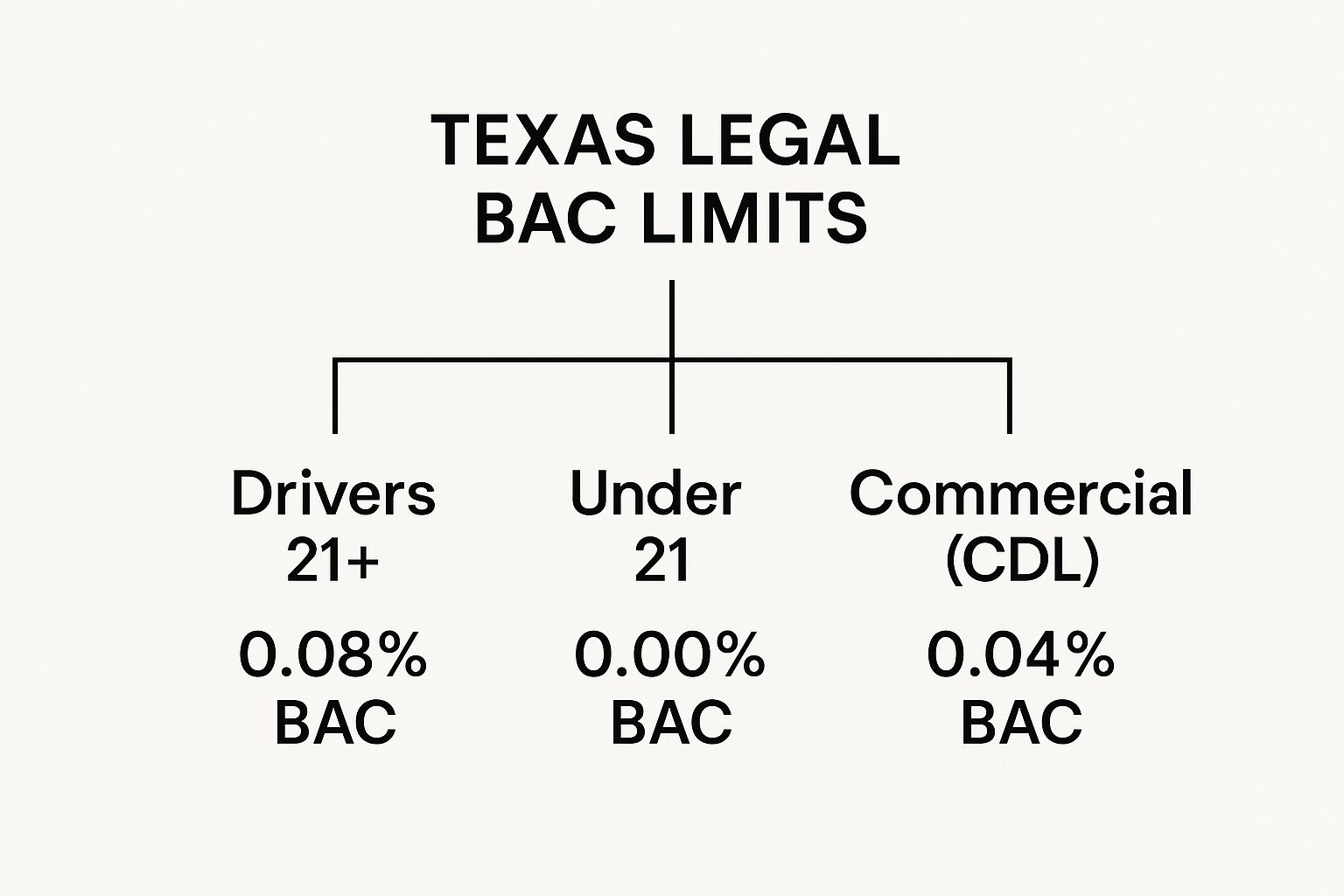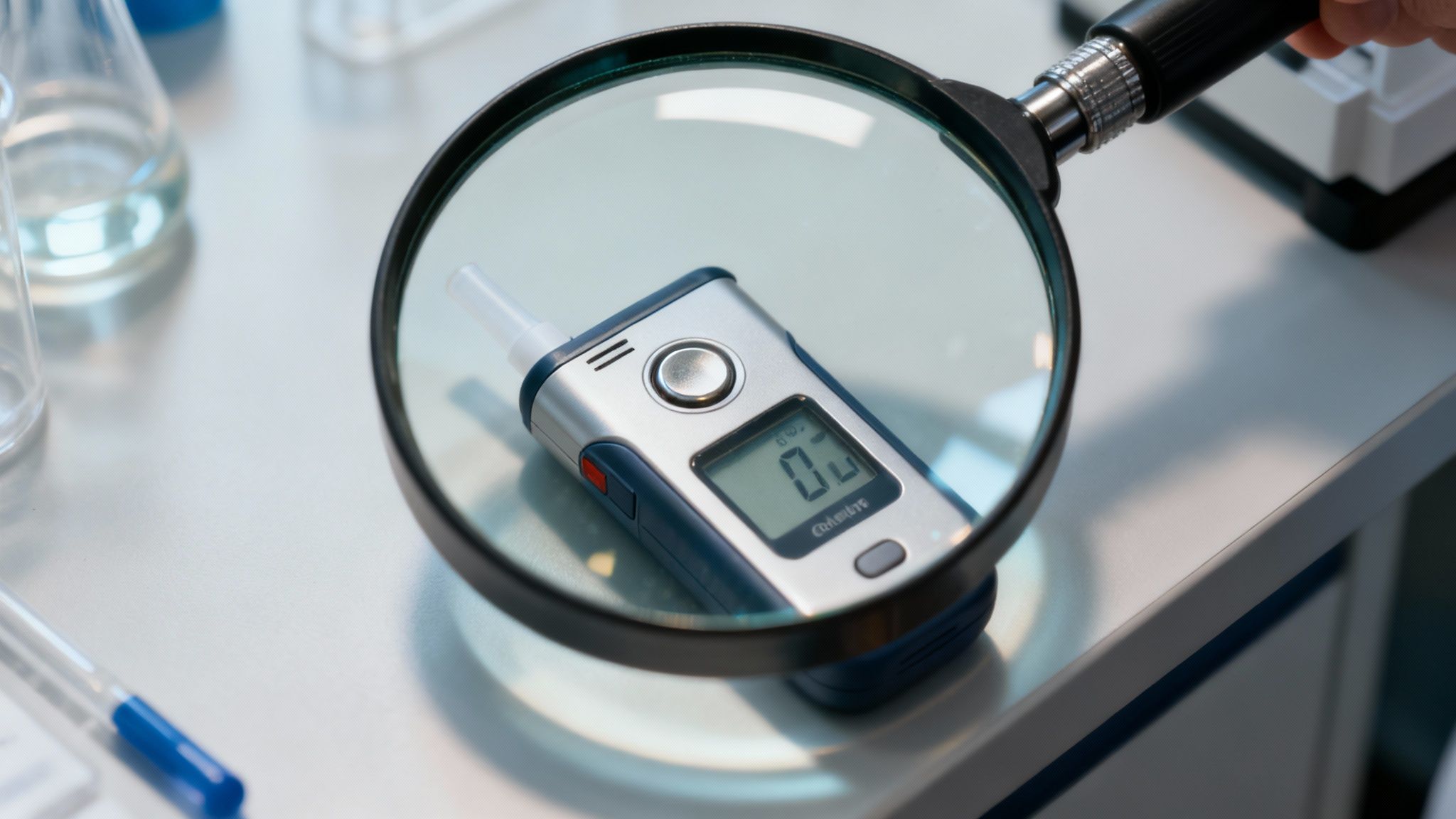A DWI arrest can be overwhelming—but you don’t have to face it alone. Understanding the law is the first step toward regaining control. In Texas, the number everyone knows is 0.08%. That’s the legal limit for Blood Alcohol Concentration (BAC) for most drivers over 21, and it's the standard the state uses to measure the amount of alcohol in your bloodstream.
Understanding the Texas BAC Limit
A DWI arrest can be a shock, but it’s crucial to remember that an arrest is not a conviction. The prosecution will lean heavily on your Blood Alcohol Concentration (BAC) as their key piece of evidence, but that number is just one piece of a much larger puzzle.
Think of your BAC level as a single snapshot, not the whole film. Many factors can throw a BAC test's accuracy into question—from how the machine was calibrated to the way the officer administered the test. This is exactly where a strong defense begins. A skilled Houston DWI lawyer doesn't just take that number at face value; they dig into the entire process to make sure your rights were protected every step of the way.
The Different Legal Limits Explained
Texas law isn't one-size-fits-all when it comes to BAC. The rules change depending on who is behind the wheel. The diagram below breaks down the specific legal limits for the three main driver categories in the state.

As you can see, the consequences for drinking and driving are far from uniform. The standards get much, much stricter for commercial drivers and anyone under the age of 21.
To give you a clearer picture, here’s a simple table summarizing the different legal limits.
Texas Legal BAC Limits at a Glance
| Driver Category | Legal BAC Limit | Special Notes |
|---|---|---|
| Standard Drivers (21+) | 0.08% | This is the most common legal limit for adult, non-commercial drivers. |
| Commercial Drivers | 0.04% | CDL holders are held to a much higher professional standard, even in their personal vehicles. |
| Underage Drivers (Under 21) | Any Detectable Amount | Texas has a zero-tolerance policy. Any measurable amount of alcohol can lead to a DUIA charge. |
Understanding these distinctions is critical because they dramatically change the charges you could face and the defense strategies that will be most effective.
While the standard 0.08% is the one most people hear about, Texas law applies a zero-tolerance approach to young drivers and holds those with a commercial license to a higher professional standard. An experienced Houston DWI lawyer can break down exactly what these numbers mean for your future and start building a defense tailored to your unique situation to fight your DWI in Texas.
How Legal Limits Change for Different Drivers
That magic number, 0.08%, is etched in most people's minds as the legal limit. But here’s something a lot of folks don’t realize: it’s not a one-size-fits-all rule in Texas. The law holds certain drivers to a much stricter standard, and what’s perfectly legal for one person can land another in serious trouble.
Knowing where you stand is the first step in building a smart defense. The rules are different depending on your age and the type of license you hold. And for some, the consequences are far more severe.
For Drivers Under 21
Texas has absolutely zero tolerance for underage drinking and driving. This isn't just a slogan; it's the law. If you are under 21, you can be charged with Driving Under the Influence (DUI) for having any detectable amount of alcohol in your system.
We're talking about a BAC as low as 0.01%. It’s a clear message from the state designed to prevent underage drinking and driving before it starts.
For Commercial Drivers (CDL Holders)
If you drive for a living with a Commercial Driver's License (CDL), the stakes get much higher. The legal limit for CDL holders is slashed in half to 0.04% BAC.
And here’s the critical part: that lower limit applies whether you’re behind the wheel of a big rig or just driving your own personal car on a Saturday afternoon. A DWI conviction doesn't just put your freedom at risk—it threatens your entire career. If you’re in this situation, it’s vital to understand the immediate steps for protecting your CDL after a DWI.
You might be surprised to learn that these limits are all about public health priorities. For example, legal BAC limits vary widely around the world. Many European countries set their standard even lower at 0.05%.
On top of all this, you don't even have to be intoxicated to face charges. Simply having an open container of alcohol within reach in your passenger area can lead to a Class B misdemeanor charge. This adds another layer of complexity to your case, even if your BAC was well below the legal limit. An experienced DWI lawyer can dig into these specific details to protect your rights.
What Happens After a DWI Arrest in Texas?
Getting charged with a DWI is overwhelming. Your mind is probably racing with questions about what comes next. But before you panic, remember this: understanding the potential consequences is the first step toward building a strong defense, not a reason to lose hope.

A DWI charge in Texas kicks off two separate legal battles that run at the same time: one administrative and one criminal. It’s absolutely critical to address both head-on.
The Two Fronts of a DWI Case: ALR Hearing and Criminal Charges
First up is the administrative side, which is all about your driver's license. The moment you're arrested, the clock starts ticking on an automatic license suspension. You have a very short window—only 15 days—to request an Administrative License Revocation (ALR) hearing to fight it. If you miss this deadline, you forfeit your right to challenge the DWI license suspension.
At the same time, the criminal case moves forward on a separate track. The penalties here depend heavily on the specifics of your arrest and whether you have any prior offenses. We're talking about potential fines, jail time, and a permanent criminal record, but these are potential outcomes, not guarantees. The consequences for a first-offense DWI in Texas are significantly different from those for a repeat offense.
The penalties for exceeding the legal limit are serious worldwide. For instance, some countries in Europe impose lengthy driving bans and even prison sentences for a first offense over 0.08% BAC. Discover more insights about drink-driving limits across the globe on discovercars.com.
The most important thing to remember is that an arrest does not equal a conviction. A skilled Houston DWI lawyer’s main job is to dig into every piece of evidence, challenge the state's arguments, and work to get these potential penalties reduced or even dismissed entirely. This is how you protect your freedom and your future.
How to Fight a High BAC Reading
When you see a BAC number over the legal limit, it’s easy to feel like the case is already lost. But here’s something the prosecution doesn’t want you to forget: those tests are far from perfect. Both breathalyzers and blood tests are complex scientific procedures, and they depend entirely on flawless execution and perfectly maintained equipment. Any slip-up along the way can—and absolutely should—be challenged.

This is where a real defense strategy begins to take shape. An experienced Houston DWI lawyer will dig into every single detail of how your BAC was measured. The mission is simple: find the errors that create reasonable doubt about the number the state is banking on to convict you.
Common Ways to Challenge BAC Evidence
BAC tests are surprisingly vulnerable to a whole host of problems. A skilled attorney knows exactly where to look, asking the tough questions that can dismantle the prosecution's case. We scrutinize the process from start to finish, hunting for weaknesses in several key areas.
Potential angles for a strong defense often include:
- Improper Administration: Was the officer who gave you the breath test even certified to operate the machine? Did they follow the mandatory 15-minute observation period to make sure nothing else contaminated the sample? Little mistakes here can have a huge impact.
- Machine Malfunction or Calibration Errors: A breathalyzer isn't a magic box; it's a sensitive instrument that needs constant maintenance and precise calibration to work right. We’ll demand the machine’s service logs to see if it was in perfect working order on the day of your test. If it wasn't, that result is questionable.
- Issues with the Blood Draw: For blood tests, the "chain of custody" is everything. Was the blood drawn by a qualified phlebotomist? Was the vial properly sealed and stored to prevent contamination before it ever reached the lab? Any break in this chain can compromise the result.
- External and Medical Factors: Your own body can sometimes betray you. Certain medical conditions, like GERD or diabetes, are known to produce falsely high BAC readings. Even something as simple as a low-carb or keto diet can create "mouth alcohol" that a breathalyzer mistakes for intoxication from drinking.
A BAC number is just one piece of evidence—it is not an automatic conviction. The state carries the full burden of proving that the number is accurate and that it was obtained legally. Any failure on their part is an opening for your defense.
Challenging your BAC result means putting the test itself on trial. A successful challenge can be the single most important factor in getting your DWI charges reduced or even dismissed entirely.
Your First Steps After a DWI Arrest
The moments and days right after a DWI arrest are absolutely critical. It’s completely normal to feel shocked, confused, or even angry, but what you do next can make all the difference in protecting your future. The key is knowing you have rights and a clear path forward.

The single most important thing to do is stay calm and use your right to remain silent. You’re required to give your basic identification, but that’s it. You don’t have to answer questions about where you were, what you drank, or where you were going. Anything you say can—and will—be used against you later, so it's always best to wait until you have a lawyer by your side.
Protecting Your Driving Privileges: Request an ALR Hearing
Now for the first crucial deadline—and it's one a lot of people miss. You have only 15 days from the date of your arrest to request an Administrative License Revocation (ALR) hearing. This is a civil process, completely separate from your criminal case, and it’s your only shot at preventing the automatic suspension of your driver’s license.
If you miss this deadline, you’ll face an automatic DWI license suspension. Acting fast is essential to keep your life moving while we work on the criminal charges.
Once you’ve been released from jail, usually on bond, your number one priority should be calling a skilled Houston DWI lawyer. An experienced Texas DUI attorney can jump in and immediately take control of the situation for you. This includes:
- Requesting your ALR hearing to protect your license.
- Starting the process of gathering and preserving crucial evidence.
- Analyzing every detail of your arrest to find weaknesses in the state’s case.
- Building a strategic plan to defend your rights from day one.
Taking a proactive approach puts you in the strongest possible position right from the start. You don’t have to go through this complex process alone—let a professional guide you and fight for the best outcome possible.
Key Texas DWI Terms You Should Know
Once you get a handle on the legal limit, it's natural for more specific questions to pop up. A DWI charge is never simple, and getting clear, straightforward answers is the first step toward feeling like you're back in control. We've defined some of the most common terms you will encounter after a DWI arrest in Texas.
Our goal here is to arm you with the knowledge to make smart decisions. Understanding these legal concepts is absolutely critical when it's time to protect your rights.
What Is "Blood Alcohol Concentration" (BAC)?
BAC stands for Blood Alcohol Concentration. It is the percentage of alcohol in your bloodstream. In Texas, a BAC of 0.08% or higher is considered per se intoxication, meaning the number itself is sufficient proof of intoxication for a DWI charge in most cases.
What Are "Field Sobriety Tests" (FSTs)?
Field Sobriety Tests (FSTs) are a series of physical and mental exercises that police officers use to assess a driver's impairment. The three standardized tests are the Horizontal Gaze Nystagmus (eye test), the walk-and-turn, and the one-leg stand. These tests are highly subjective and can be challenged in court. You have the right to refuse them.
What Is Texas's "Implied Consent" Law?
This is a big one. The implied consent law is a cornerstone of Texas DWI cases. Here's what it means in plain English: just by getting behind the wheel on a public road in Texas, you have automatically, or "implicitly," agreed to give a breath or blood sample if you are lawfully arrested for DWI. Refusing a chemical test triggers an automatic driver's license suspension (an administrative license suspension), but it also means the prosecutor has less hard evidence to use against you in court.
What’s the Difference Between a DWI and a DUI in Texas?
People use these terms interchangeably all the time, but in Texas, they mean very different things and apply to completely different age groups.
- DWI (Driving While Intoxicated): This is the charge for adults (21 and over) who are caught driving while impaired or with a BAC of 0.08% or higher.
- DUI (Driving Under the Influence): This charge is exclusively for minors (under 21). Thanks to the state's zero-tolerance policy, a minor can be charged with DUI for having any detectable amount of alcohol in their system.
It's vital to know which charge you're facing, because the penalties, consequences, and defense strategies are worlds apart.
A DWI arrest is overwhelming, but you don't have to face it alone. At the Law Office of Bryan Fagan, PLLC, our experienced Houston DWI lawyers are ready to stand up for your rights, protect your future, and walk you through every single step of your case. For a free, confidential case evaluation to discuss how we can help you fight your DWI in Texas, contact us today. We are here to provide the strategic, reassuring legal help you need right now.

